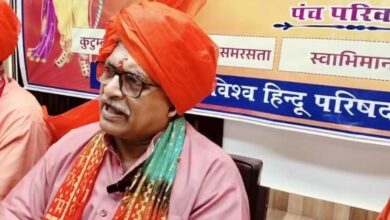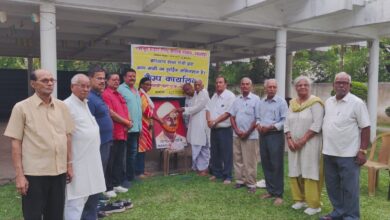मैक्स फैशन ने स्टाइल आइकन कल्कि कोचलिन के साथ अपने लेटेस्ट ‘न्यू न्यू यू’ कैंपेन को लॉन्च किया

जमशेदपुर: दुबई स्थित लैंडमार्क ग्रुप के सबसे पसंदीदा फैशन ब्रांड मैक्स फैशन ने ‘न्यू न्यू यू’ अभियान के लिए प्रसिद्ध अभिनेत्री और स्टाइल आइकन कल्कि कोचलिन के साथ एक विशेष सहयोग के माध्यम से ब्रांड के एक नए अध्याय में कदम रखा है। यह कैंपेन नए आत्मविश्वास के क्षेत्र में कदम रखता है, विकास की भावना पैदा करता है जो ग्राहक को स्टाइल की परिवर्तनकारी शक्ति के कारण एकदम नया महसूस कराता है। यह कैंपेन एक सुसंस्कृत संग्रह का हिस्सा है, जो उत्सवों या दोस्ताना समारोहों (वर्कवियर, कैजुअल आउटफिट्स, फ्यूजन फेस्टिव वियर, या हाई-ग्लैम अवसरों के कपड़े) के लिए पुनर्निर्माण की भावना को व्यक्त करता है – ये स्टाइल इस फेस्टिवल सीजन के लिए टोन सेट करता है।
इस स्टाइलिश संग्रह के लिए किसी ऐसे व्यक्ति की ज़रूरत थी जो इसकी चंचलता के साथ पूरी तरह से मेल खाता हो, कोई ऐसा व्यक्ति जिसके पास अपने व्यक्तित्व के प्रति सच्चे रहते हुए पारंपरिक फैशन की सीमाओं को तोड़ने की अनूठी क्षमता हो- और शानदार कल्कि कोचलिन से बेहतर कौन हो सकता है- जो हर जीवंत भूमिका के साथ खुद को नयापन देती है। ‘न्यू न्यू यू’ कलेक्शन के साथ, मैक्स फैशन का लक्ष्य अपने ग्राहकों को अपने नवीनतम पश्चिमी और उत्सव शैलियों और एक्सेसरीज़ के साथ अपने व्यक्तित्व के विभिन्न पहलुओं को तलाशने की स्वतंत्रता देने के लिए प्रेरित करना है।
कल्कि के बोल्ड विकल्प, उनके करियर और व्यक्तिगत शैली दोनों में, आत्मविश्वास और आत्म-अभिव्यक्ति को प्रेरित करते हैं – ऐसे मूल्य जो नए युग के महत्वाकांक्षी परिवारों से जुड़ने के ब्रांड के दृष्टिकोण के साथ संरेखित होते हैं
‘न्यू न्यू यू’ प्रस्ताव की अवधारणा के अनुरूप, मैक्स फैशन अपनी लंबे समय से चली आ रही हर हफ्ते नए स्टाइल लॉन्च करने की प्रतिबद्धता को पूरा करता है, जो ताजगी और उत्साह लाता है इसके 520+ स्टोर्स में जो 210+ भारतीय शहरों में फैले हुए हैं, और ऑनलाइन www.maxfashion.in पर भी उपलब्ध हैं। यह दृष्टिकोण मैक्स फैशन की ग्राहकों को नवीनतम ट्रेंड्स प्रदान करने के प्रति समर्पण को मजबूत करता है, यह सुनिश्चित करता है कि उनके लिए एक निरंतर और गतिशील खुदरा और ऑनलाइन खरीदारी अनुभव उपलब्ध हो।
कैंपेन फिल्म भी इस कैंपेन की नवीनता को उजागर करने से नहीं कतराती है। एक शानदार यूरोपीय माहौल में शूट की गई फिल्म में कल्कि को शहर में कई ड्रेस में घूमते हुए दिखाया गया है- लड़कियों के साथ ब्रंच के लिए आधुनिक शिफली को-ऑर्ड सेट से लेकर एक खूबसूरत दोपहर के लिए एक शानदार प्रिंटेड बैलून ड्रेस तक; या एक औपचारिक आउटिंग के लिए एक शिमर को-ऑर्ड सेट से लेकर पार्टी के लिए एक शानदार हाई-शाइन जोड़ी तक – फिल्म संग्रह के कई अलग-अलग जीवंत मूड को समेटे हुए है। हर बदलाव के साथ हम संग्रह की बहुमुखी प्रतिभा को देखते हैं और कैसे इसमें हर किसी के लिए कुछ न कुछ है – चाहे उनका व्यक्तित्व कुछ भी हो।
मैक्स फैशन के लिए इस मजेदार, नए कैंपेन का चेहरा बनने पर, कल्कि कोचलिन कहती हैं, “मेरा मानना है कि फैशन किसी के व्यक्तित्व का विस्तार है, और मैक्स फैशन का ‘न्यू न्यू यू’ कैंपेन मुझे ऐसा करने का पूरा मौका देता है। मैं इसका हिस्सा बनकर उत्साहित हूं और मुझे कहना होगा कि मैक्स फैशन ने मुझे अपने कूल, वाइब्रेंट और कम्फर्टेबल स्टाइल्स से पूरी तरह से चौंका दिया है।”
शानदार कल्कि कोचलिन के साथ साझेदारी पर, मैक्स फैशन की मार्केटिंग हेड पल्लवी पांडे कहती हैं, “जब हम मैक्स फैशन में बदलाव की रोमांचक यात्रा पर निकल रहे हैं, तो ‘न्यू न्यू यू’ कैंपेन हमारे कस्टमर के लिए लगातार विकसित होने और नए, ट्रेंडसेटिंग स्टाइल लाने की हमारी प्रतिबद्धता है। कल्कि कोचलिन के साथ यह सहयोग हमारे ब्रांड की बोल्ड, कॉन्फिडेंट और हमेशा विकसित होने वाली भावना का प्रतिनिधित्व करता है। हमारा लक्ष्य अपने ग्राहकों को नई संभावनाओं का पता लगाने और आधुनिक, महत्वाकांक्षी भारतीय परिवार के लिए डिज़ाइन किए गए हमारे नवीनतम संग्रह के साथ खुद के हर पहलू को अपनाने के लिए प्रेरित करना है।”
मैक्स फैशन के डिप्टी सीईओ सुमित चांदना कहते हैं, “मैक्स फैशन की वृद्धि और सफलता हमेशा हमारे ग्राहकों को मूल्य, गुणवत्ता और ताज़ा फैशन देने की हमारी प्रतिबद्धता से प्रेरित रही है। ‘न्यू न्यू यू’ अभियान के साथ, हम न केवल एक गतिशील नया संग्रह लॉन्च कर रहे हैं, बल्कि 210+ शहरों में 520 से अधिक स्टोर में निरंतर नवाचार लाने के लिए अपनी रिटेल रणनीति को भी मजबूत कर रहे हैं। यह अभियान हमारे व्यवसाय में एक नया अध्याय शुरू करता है, जहां हम ग्राहकों की संतुष्टि और स्टाइल विकास के प्रति अटूट समर्पण के साथ, फिजिकल स्टोर और ऑनलाइन दोनों में अपनी उपस्थिति का विस्तार करने पर ध्यान केंद्रित करते हैं।”
मैक्स फैशन और कल्कि कोचलिन ‘न्यू न्यू यू’ कैंपेन 20 सितंबर को भारत भर के सभी मैक्स फैशन स्टोर और www.maxfashion.in पर लॉन्च हुआ।


